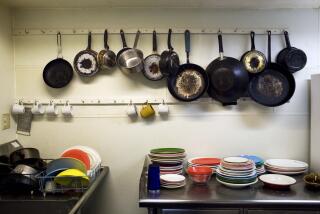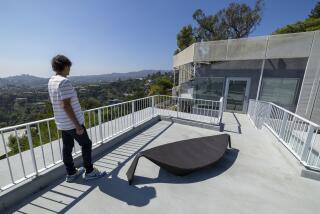Croatia: Seeking shelter in a <i>sobe</i>
Reporting from Dubrovnik, Croatia â He was the least aggressive among the dozens of locals waving sobe signs in our faces.
My fiancĂŠ, Jay, and I had just stepped off the ferry onto the Croatian island of Korcula, where the placard-carriers were standing on the dock, competing with one another for the opportunity to provide arriving tourists with a bed for a few bucks. But Quiet Guy (for lack of a better name) stood calmly with his sign, perhaps noticing we were amateurs. He asked in English whether Jay and I needed a room. Indeed we did. He showed us a brochure with photos of his place, so he seemed legit.
Sobes (pronounced SO-bays), or family hotels, are rooms for rent in private homes and are prevalent throughout Croatia and along the Adriatic Sea. They range from $10 to $50 a night and may be the most authentic way to experience the countryâs stunning beauty. But they are also largely unregulated â as was my anxiety. What if we got robbed? What if the bed was infested with bugs?
This lodging option was way out on a limb for me. I am a vacation over-planner, comfortable only when I know Iâm guaranteed a good place to eat, sleep, and a way to get around. With plans to visit five locations in nine days, we wouldnât stay in any one place for more than a couple of nights. I also knew we didnât want to be bottled up in an overpriced hotel room. This lodging option began to make sense.
On our early October trek from the Croatian capital of Zagreb to the Dalmatian Islands along the Adriatic, we stayed in sobes ranging from basic to luxurious. Some of the accommodations were hostel-like, in small bedrooms in peopleâs homes. But unlike hostels, youâre not sleeping in the same room as others, or on bunk beds. Other sobes were private apartments in unbeatable locations.
Sobes are identified by clearly marked signs posted outside homes and are also advertised by men and women who greet tourists at ferry, bus and train terminals with signs or a whispered or shouted, âNeed a room?â Because Croatiaâs hotel stock consists mostly of bland 1960s- and â70s-style mid- and high-rises, with rooms ranging from $100 to $300 a night depending on the season, locals have learned they could satisfy demand as more tourists flock to Croatiaâs premier beaches.
We approached Quiet Guy because he appeared charming and calm. âCome see. Iâll show you,â he said. âJust $30.â I had booked most of our sobes online before leaving the States, but a blip in the off-season ferry schedule had forced us to forgo our hop to the trendy party island of Hvar and go, instead, to its quieter neighbor, Korcula.
We followed Quiet Guy past the Main Square and Old Town castle to a small apartment building near the main harbor. He left us in front of the second-floor apartment while he retrieved the key from his office upstairs. When Quiet Guy returned and opened the apartment door, I couldnât believe my eyes.
Before us was a spacious, two-bedroom apartment with a kitchenette and a stunning view of the harbor, tiny historic center and coastal mountain backdrop. Great location? Privacy? A killer view? Weâll take it. We were free to come and go without running into a family member or having to lock the bedroom. We even had a queen bed and an alarm clock.
By the time we had made our way to Korcula, we were becoming sobe pros. At an earlier stop in Plitvice Lakes, we had been spoiled, but not before becoming slightly frightened and lost. We had spent two hours on a bus from Zagreb to the small central Croatian town near the Bosnian border, passing through the scenic Slunj region. People chopped wood outside of their homes in rural villages. It was at that point that we began to pray our sobe in Plitvice had electricity and gas. We exited the bus, heavy backpacks loading us down.
Luckily, I found my Villa Katja reservation from Priceline-Europe.com. Some technologically savvy sobe owners post vacancies online, but in Plitvice, sobe signs were everywhere. We wandered to one of three government-owned hotels in this sleepy town and national park, which draws people from around the world. Plitvice Lakes National Park, a UNESCO World Heritage site, is situated on a plateau and separated by natural dams of travertine into 12 upper lakes and four lower lakes formed by runoff from the mountains, forming distinctive colors ranging from green to blue to gray.
The front-desk attendant didnât seem surprised that we were lost. She called Villa Katjaâs owner, Igor, who had built three guest bedrooms onto his modest house about a mile from the national park entrance. He was young, about 30, with a wife and baby. The rooms shared a bathroom, but no one else stayed that night.
Igorâs home had been booked all summer since he begain listing it online. I understood why. Affordable lodging was nearly impossible to find here, and at less than $100 a night, it was a steal. If it werenât for his listing, we would have knocked on doors, hoping to find a comfy, clean bed. The next morning, he brought us coffee and pastries that we expected to pay for, but he didnât charge us. The bus stop was a short walk from Igorâs house.
A six-hour bus ride took us from Plitvice to Split, our first stop on the Dalmatian Coast. Suzi, our sobe landlord in Split, picked us up from the cityâs somewhat confusing bus terminal and dropped us at the tiny $40-a-night loft apartment she owned just outside the walls of Diocletianâs Palace, the Roman emperorâs summer home circa 350 A.D. We were in a quiet back alley, where laundry was strung everywhere on clotheslines. We were pleasantly surprised to learn that we would not be sharing our sobe with anyone. There was just enough room for a small table and necessary kitchen appliances, with a small winding staircase to a loft space with a bed and nightstand.
We spent very little time in our tiny sobe over the next 24 hours. Suzi had recommended that we hike to the top of a residential hill alongside Riva, a trendy promenade along the harbor, for a killer view. That, plus a stroll through the vast fish market outside the palace and a quick layout on nearby Bacvice Beach were all we had time for in Split.
After exiting the large passenger ferry in Dubrovnik, our last destination, we were again swarmed by sobe owners.
âNeed a room, mate?â a man asked us, assuming we were Australian. Older women shoved signs in our faces. We wrestled the dayâs crowds, took a bus to the walled cityâs entrance (no cars are allowed) and entered, almost immediately finding our sobe, the Petra Guesthouse, in an alley near the main attractions. The host, who had been expecting us, led us to a room on the middle floor. There was another couple in another sobe room, but we never saw them, even though both rooms shared a bathroom on the ground floor. I was surprised that our room had two small twin beds instead of a double. But, oh, well. I had a bed.
The Petra was in a prime location for about $25 a night, a fraction of what local hotels charged. We came and went as we pleased, paddled sea kayaks around the small nearby island of Lokrum, walked on top of the city fortress and visited the world-famous Troubadour Jazz Cafe, just a few short alleys away. After late-night excursions to local pubs and restaurants we would wander back to our quaint little street and our quaint little room, a welcoming end to our sobe adventures.
About 1,000 sobes are expected to open in the next seven years, the Croatian Tourist Board says. Most will be four star and offer online booking through the Assn. of Family and Small Hotels of Croatia website at https://www.omh.hr, which states that itâs âimportant and necessaryâ to register yourself for your entire stay with it âto avoid unwittingly infringing on any local lawsâŚâ Not only will it guarantee you quality service but you will avoid possible problems, including jeopardizing your insurance coverage, a danger posed by the illegal operations of rogue agents who are not licensed to provide legal accommodation.â
It was probably a good thing I didnât know that ahead of time. We were just fine.
More to Read
Sign up for The Wild
Weâll help you find the best places to hike, bike and run, as well as the perfect silent spots for meditation and yoga.
You may occasionally receive promotional content from the Los Angeles Times.






